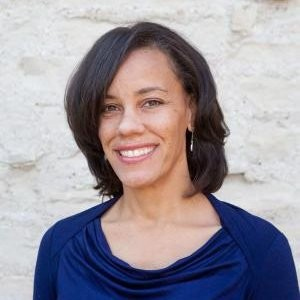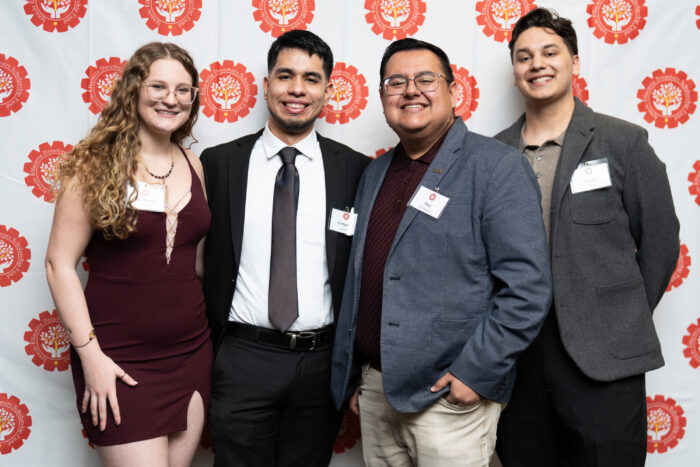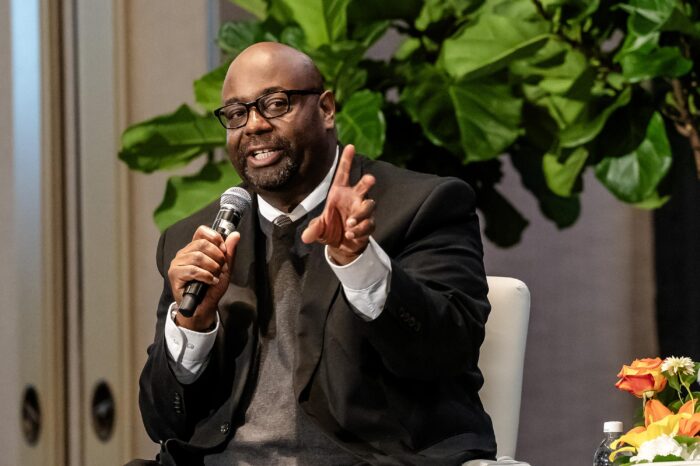
Guided by Marquette’s mission and values, faculty in the Klingler College of Arts and Sciences explore and advance the understanding of human meaning and value, the structures and dynamics of human societies, and the composition and function of the natural world.
One associate professor of psychology seeks to Be The Difference through her research into human emotion, uncovering the ways that emotion can perpetuate systemic racism and how showing empathy can help stem implicit bias.
Here in a Q&A, Dr. Nakia Gordon, associate professor of psychology, discusses the early influences on her professional career, her research and more.
What led you to a career in psychology?
Like most of the psychology majors I encounter at Marquette, I decided to major in psychology because it was an interesting course that I took in high school.
I pursued neuroscience seriously after taking a biopsychology course at the end of my sophomore year in college. I was blown away by the workings and mysteries of the brain. My only goal at that time was to understand how the brain worked.
In the first ever podcast for “Our Roots Say we are Sisters,” you mention that one of the classes you took as a college student reinforced narratives that Black individuals and other minority groups were “at the bottom” of society. In your opinion, how has past academic literature that attempts to define biological and psychological differences between Black and white individuals reinforced systemic racism?
As I mentioned in the podcast, as a first-generation, first-year college student, I did not have context for understanding the way academic literature is generated. It seemed to me it was fact that the multiple identities with which I identified were at the lowest rungs of society. I could not reconcile this with my lived experience. I did not understand that the metrics being used were centered in whiteness and would never capture the rich complexity of the Black experience. I now understand that academic literature builds upon previous literature, and when researchers start from the flawed, uncritical and often biased conclusions of other researchers they perpetuate a racist narrative.
Further, these metrics then allow white individuals and others to unconsciously or consciously accept as fact that Black individuals are inferior. Unevaluated, it seemed it would be easy for individuals to also then blame or judge people who are “below” them.
In your research, how have you worked to avoid feeding this narrative?
I often share with students that the answers we get are based on the questions we ask. If our questions are always about how Black individuals are different from white ones using metrics where white people are already advantaged, we will end up with an answer that concludes Black individuals are deficient in some way.
Thankfully, the growing number of academicians who identify with various racial and ethnic backgrounds have been asking why those differences exist from a systems-level perspective. We need to ask better questions. Why not ask what makes Black people thrive — because we certainly do. There are all kinds of questions we can ask that would undermine racism, but that is slow work.
In my research, I purposely do not analyze or even present my data in a way that would support those narratives — first, because those aren’t the questions I am asking, and second, because I would never want my research to be used to make a biased argument.
How has your work studying emotions helped explore how different people can come together and build relationships, as opposed to exploring how groups differ?
A question about emotions and how they can unite or divide people came up in my class today. I was asking if emotions were functional from an evolutionary perspective; in other words, do emotions help people survive and thrive? A student replied that emotions are functional if they are directed at the people in your “tribe.”
I acknowledged that in recent years there had been academic ideas that we are biologically predisposed to care only about “our” tribe, but I shared that those ideas might also just be based in how we are socialized.
There is research that refutes those ideas and rather supports the idea that if we chose to have a small insular social group, then yes, we remain wary of others. However, if we choose to expose ourselves to a broader range of people, then we don’t have that fear.
Emotions enhance our social connection — indeed, some theories of emotion suggest that this is the primary reason they exist. They signal to us that there is something important happening to which we should attend. When we experience a strong emotion, it can show in our face, body and the actions we take. When we are sad, our emotional expressions can elicit comfort from those who care about us. When we show gratitude, it strengthens the bond we have with the person who did something kind for us. And when we witness injustice, we often feel anger and engage in prosocial behaviors to right the wrong we witnessed. In my lab, we are collecting data that shows that not only can people infer what we are feeling from how we express ourselves, but that their physiology (e.g., heart rate) will automatically match ours — giving them a direct experience.
What does this say about how emotions can unite people?
There is another body of my work that demonstrates that the more we see individuals for their unique talents and gifts, the less we see them as different than ourselves. Work I did with the Chicago Police Department using virtual reality reinforces that idea. (Learn more about Gordon’s CPD work on WUWM-FM’s “Lake Effect.”)
Finally, some of my other work shows that people’s level of concern for racialized victims has more to do with how they process their own emotions than one or two identity check boxes.
Some of your work focuses on how empathy can decrease implicit bias. In what ways do you see Marquette working to increase empathy?
One instance comes to mind on how Marquette can work to increase empathy. At the Arts and Sciences Celebration of Research in November 2021, Dr. Jeanne Hossenlopp, vice president for research and innovation, gave remarks to the faculty. She led her remarks by acknowledging how difficult it was to continue doing research during COVID and how hard it was, in so many ways, during that time.
I felt seen as a faculty member and appreciated for persevering during a time that was difficult beyond the realities of COVID. Having our colleagues acknowledge and try to resolve some of the challenges different groups within the university are having is a start.
What are your hopes for Marquette’s future of welcoming and increasing diversity?
My biggest hope is that we are intentional about who we want to be and then create the infrastructure to support that identity.


